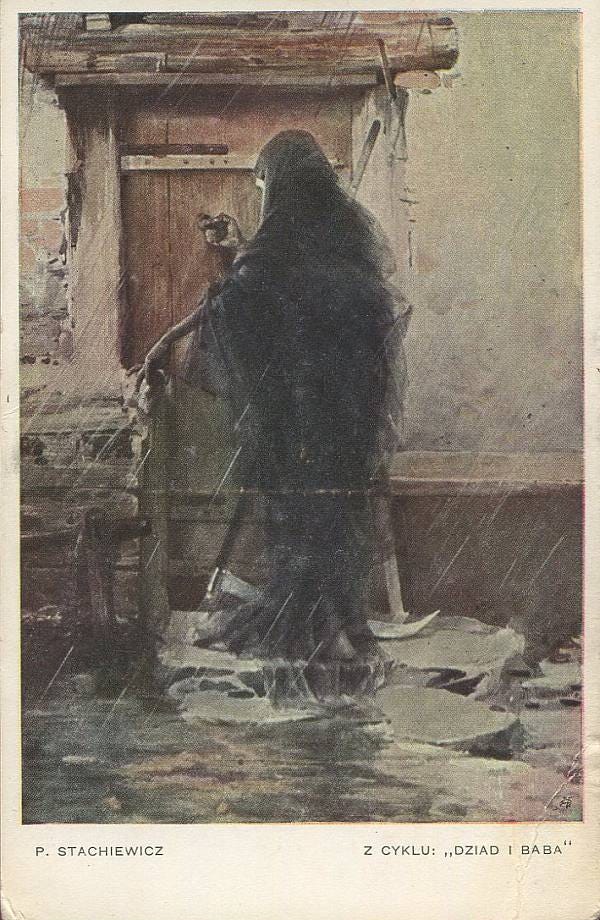The Station Hall
Martinmas, Stachiewicz, the Reaper, and Veterans Day
It's harvest time in our part of the country. The garden is mostly brown now that its work for the year is done. The pigs are due for butchering in the next couple weeks and the weather is turning colder.
November 11th is the feast of St. Martin of Tours, one of old Christendom's greats. The school I founded with my friend Dan out in Kansas took St. Martin as its patron. His feast day is called Martinmas and it is the traditional Christian harvest festival. The role that Thanksgiving played for the protestant pilgrims in America was an adaptation of the ancient feast of Martinmas. In most years there is a brief period of unseasonably warm weather around Martinmas. Secularly these days are sometimes called an “Indian Summer,” but they used to be called St. Martin's Summer.
November 11th is also Veterans Day (the 10th is the USMC Birthday). I know that Memorial Day is the intended day of commemoration for the fallen, but the two are never separate in my mind. There's an Australian folk song that emerged after WWII called “The Band Played Waltzing Matilda.” It's a tremendous song written from the perspective of a veteran of Gallipoli who lost both his legs in the battle. The last verse goes something like this:
Now every April I sit on my porch And I watch the parade pass before me. I see my old comrades how proudly they march Renewing their dreams of past glories. I see the old men all twisted and torn The forgotten heroes of a forgotten war. And the young people ask me What are they marching for and I ask myself the same question.
It is no disrespect to veterans, of whom I am one, to say that the day always strikes me a little like it strikes the character in the song. Especially when the wars are of dubious value and far away, veterans at home can be a little like ghosts trying to find a way out of purgatory.
Because Martinmas and Veterans Day fall on the same day, the traditional harvest imagery of the reaper carrying a scythe associated with death comes to mind. You might know that the sickle is the tool for harvesting fruit when it is ripe, so why is the scythe the emblem of death? Well, the scythe is the tool for mowing hay, and as Hilaire Belloc noted:
“For what we get when we store our grass is not a harvest of something ripe, but a thing just caught in its prime before maturity: as witness that our corn and straw are best yellow, but our hay is best green. So also Death should be represented with a scythe and Time with a sickle; for Time can take only what is ripe, but Death comes always too soon.”
The Polish painter Piotr Stachiewicz provides the images of the day. The first is St. Martin of Tours on his horse and featuring the cloak which became famous when he cut it in half. The second, below, is an image of death at the door carrying a scythe. It is from a series of illustrations Stachiewicz completed for the poem “Dziad I Baba” about death coming for an elderly and (purportedly) devoted couple.
As Belloc notes, death should carry a scythe because death comes too soon. Here is a poem I wrote telling a true story from very early in my time in the Marine Corps. It remembers those for whom death came too soon.
The Station Hall
There isn’t much that I remember well.
It was finally September after an endless
summer. We had left San Diego and MCRD*
on a plane and were going to be married in the next few days.
Probably it was late and going to rain.
Recall. Regret. Both mean to greet again.
We were heading east to marry then making
west once more to train for war. Just one
of the empire’s infantrymen and his wife in the making
now in Philly waiting for a train.
I don’t remember now but surely we
were happy, if bewildered, and cashing
in on love, time’s currency’s inflation.
Must have been evening in the station when
a stranger handed me the cash and said….
Well, I don’t remember what he said.
“Why don’t the two of you grab a nice bite to eat?”
Might have been a question asked in pleasure or
regret. We must have looked so picturesque:
a red-haired girl, a green uniform, and the rain.
Could be he glimpsed a picture of an ending
in the clap of a roadside bomb or a missing
zodiac come dawn. Or maybe it was
scrubs and blood in a delivery room, or paper
in a courtroom’s dim and flickering light.
Well, maybe it’s been close, but we’ve been spared
all that. Yet my memory’s station hall
is packed with those once-picturesque now severed
or fallen. And I’d go broke if I could walk
that hall and buy them all a bite before they go.
*Marine Corps Recruit Depot





So visual, from start to finish. I can smell it all - the dust from the harvest; the rain; the station hall. What a great story of generosity - what did you buy with the money?
Well -- you are also a poet! That's a very fine poem. How many have you written? Just today I've examined another one of your poems -- St. Martin's Academy -- for the first time. It too is deeply inspiring.